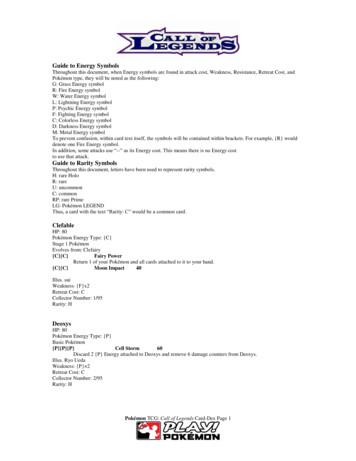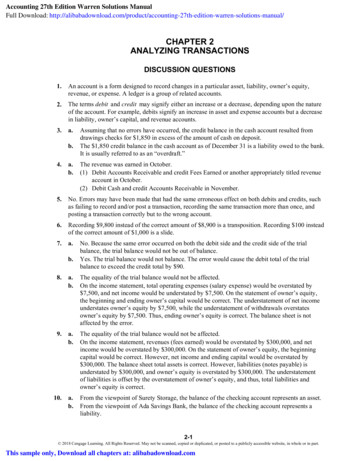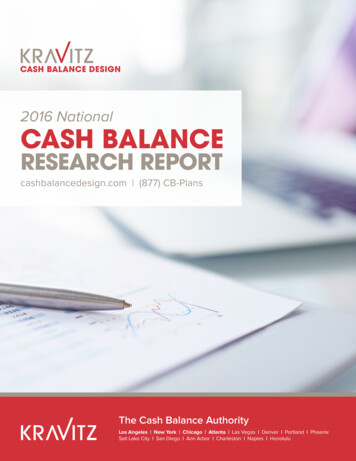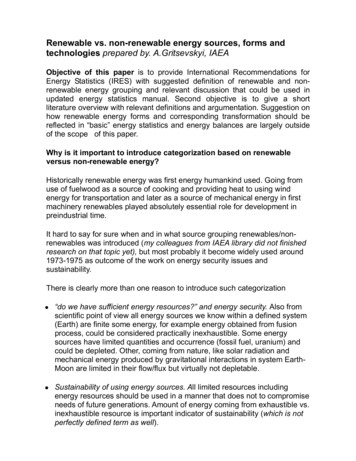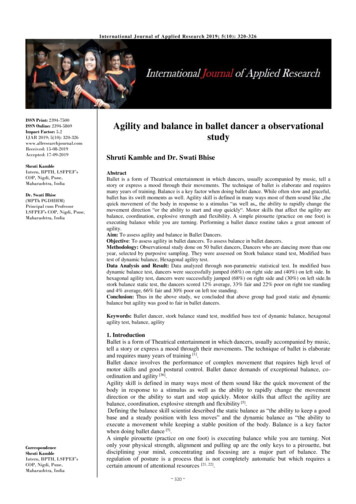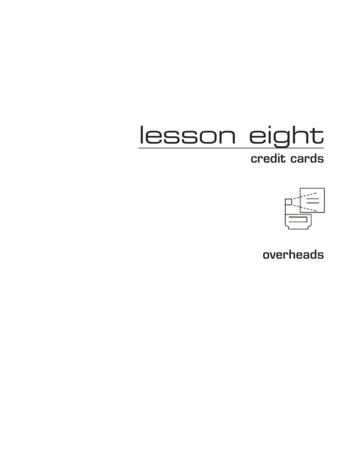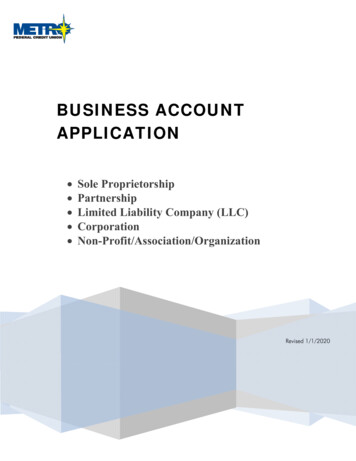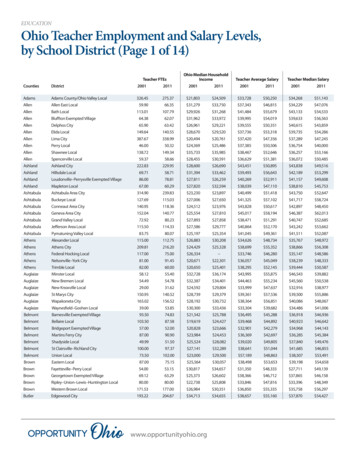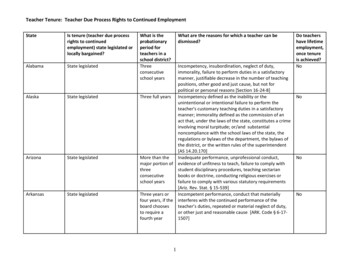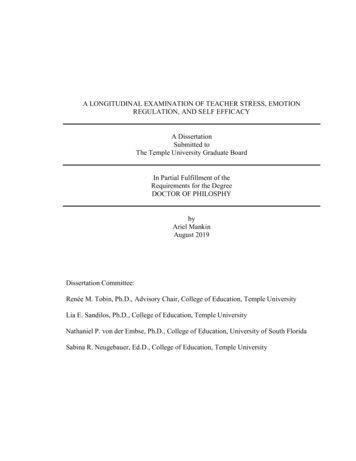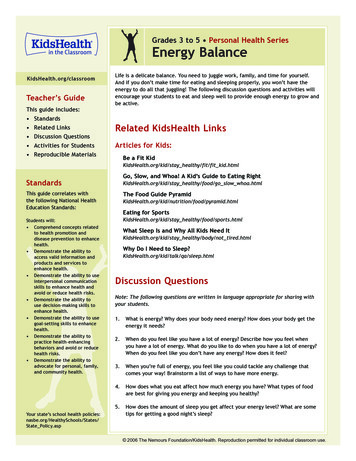
Transcription
Grades 3 to 5 Personal Health SeriesEnergy BalanceKidsHealth.org/classroomTeacher’s GuideThis guide includes:Life is a delicate balance. You need to juggle work, family, and time for yourself.And if you don’t make time for eating and sleeping properly, you won’t have theenergy to do all that juggling! The following discussion questions and activities willencourage your students to eat and sleep well to provide enough energy to grow andbe active. Standards Related Links Discussion Questions Activities for StudentsRelated KidsHealth LinksArticles for Kids: Reproducible MaterialsBe a Fit KidKidsHealth.org/kid/stay healthy/fit/fit kid.htmlGo, Slow, and Whoa! A Kid’s Guide to Eating RightStandardsKidsHealth.org/kid/stay healthy/food/go slow whoa.htmlThis guide correlates withthe following National HealthEducation Standards:The Food Guide PyramidStudents will: Comprehend concepts relatedto health promotion anddisease prevention to enhancehealth. Demonstrate the ability toaccess valid information andproducts and services toenhance health. Demonstrate the ability to useinterpersonal communicationskills to enhance health andavoid or reduce health risks. Demonstrate the ability touse decision-making skills toenhance health. Demonstrate the ability to usegoal-setting skills to enhancehealth. Demonstrate the ability topractice health-enhancingbehaviors and avoid or reducehealth risks. Demonstrate the ability toadvocate for personal, family,and community health.KidsHealth.org/kid/stay healthy/food/sports.htmlYour state’s school health policies:nasbe.org/HealthySchools/States/State d.htmlEating for SportsWhat Sleep Is and Why All Kids Need ItKidsHealth.org/kid/stay healthy/body/not tired.htmlWhy Do I Need to ion QuestionsNote: The following questions are written in language appropriate for sharing withyour students.1.What is energy? Why does your body need energy? How does your body get theenergy it needs?2.When do you feel like you have a lot of energy? Describe how you feel whenyou have a lot of energy. What do you like to do when you have a lot of energy?When do you feel like you don’t have any energy? How does it feel?3.When you’re full of energy, you feel like you could tackle any challenge thatcomes your way! Brainstorm a list of ways to have more energy.4.How does what you eat affect how much energy you have? What types of foodare best for giving you energy and keeping you healthy?5.How does the amount of sleep you get affect your energy level? What are sometips for getting a good night’s sleep? 2006 The Nemours Foundation/KidsHealth. Reproduction permitted for individual classroom use.
Grades 3 to 5 Personal Health SeriesEnergy BalanceActivities for StudentsNote: The following activities are written in language appropriate for sharing with your students.Energy Times Two!Objectives:Students will: Investigate the relationship between energy and eating and sleeping well Develop a plan for boosting energy levelsMaterials: Computer with Internet accessEnergy Times Two! handout (available at: rgy handout1.pdf)Class Time:45 minutesActivity:Uh oh. You just emptied the last dime from your piggy bank. Looks like you’d better get a job! Luckily, the neighbordown the street needs someone to watch her four-year-old twins after school until she comes home from work.When you get the job, you figure you’ll be chasing the kids around, getting lots of exercise. Instead, every timeyou’re there, the twins are sitting on the couch, watching television. When you try to get them moving, they cryand complain they are too tired to play. You decide it’s time to make some changes to give these kids some energy!Before you make a plan, take a look at the Energy Times Two! handout to find a note from the twins’ mom tellingyou about how they eat and sleep. Then, check out the articles at KidsHealth to learn more about good eatingand sleeping habits. Finally, use the spaces on the handout to make some suggestions for how to charge the twins’batteries so they have enough energy to grow and play!Extensions:1.To really help the twins rev up their energy levels, you’re going to have to get their mom involved. With a friend,role-play a conversation with the twins’ mom to tell her about the changes you’ve made to the kids’ diet andsleep routines, and why. Use facts from KidsHealth to back up your ideas.2.The twins really liked staying up late and eating whatever they wanted, so they are not happy about the changesyou are making. You think it might be helpful to explain the importance of the changes by reading a book tothem. Write and illustrate a short story for young children explaining why it’s important to get enough sleep andeat right to stay healthy and have energy.3.You decide that the next night you babysit, you are going to feed the twins a healthy meal. Plan a healthy dinnermenu for the twins that would give them an energy boost, using the Food Guide Pyramid for guidance. 2006 The Nemours Foundation/KidsHealth. Reproduction permitted for individual classroom use.
Grades 3 to 5 Personal Health SeriesEnergy BalanceEnergy DecisionsObjectives:Students will: Explore scenarios involving energy levels Expand their decision-making skillsMaterials: Computer with Internet accessEnergy Decisions handout (available at: rgy handout2.pdf)Class Time:45 minutesActivity:You need energy to perform at your best, whether it’s acing your math test or dunking the game-winning basket! Butyou also need to make time to eat and sleep right to get that energy. Balancing the demands of your life with eatingand sleeping properly can be tough. When put to the test, will you make the decision that gives you energy or zapsyour energy? Check out the scenarios listed on the Energy Decisions handout to find out! Select one and read thearticles at KidsHealth to gather more information about how eating and sleeping right give your body energy. Thenanswer the following questions about your scenario: What decisions could you make?What are the possible outcomes of each decision?Which is the healthiest decision you could make, and why? How will this decision give you more energy?Extensions:1.Now that you’ve exercised your decision-making powers, it’s time to make some decisions about your ownenergy level! What can you do to have more energy? Come up with one goal for yourself that will give you moreenergy. What do you need to meet your goal? Create a chart to track your progress toward achieving your goal.Reproducible MaterialsHandout: Energy Times on/energy handout1.pdfHandout: Energy trition/energy handout2.pdfKidsHealth.org is devoted to providing the latest children’s health information. The site, which is widelyrecommended by educators, libraries, and school associations, has received the “Teachers’ Choice Awardfor the Family” and the prestigious Pirelli Award for “Best Educational Media for Students.” KidsHealth comesfrom the nonprofit Nemours Foundation. Check out www.KidsHealth.org to see the latest additions! 2006 The Nemours Foundation/KidsHealth. Reproduction permitted for individual classroom use.
Personal Health SeriesEnergy BalanceName:Date:Energy DecisionsInstructions: When put to the test, will you make the decision that gives you energy or zaps your energy? Check out the followingscenarios to find out! Select one scenario, and read the articles at KidsHealth to gather more information about how eating andsleeping right give your body energy. Then answer the questions below about your scenario.Scenario 1:You have a huge math test tomorrow, but you studied all week and you think you’re ready for it. Lucky for you, there’s amarathon of your favorite show on TV tonight! The last episode ends at midnight. You want to stay up and watch it, butthat’s pretty late. What should you do?Scenario 2:You’ve joined the soccer team, and you’ve been practicing every day and playing games on the weekend. Since the startof the season, you’ve been so hungry, even though you feel like you’ve been eating constantly. You don’t want to pack onthe pounds, but you don’t know how to curb your hunger. What should you do?Scenario 3:You like to keep yourself busy. You have piano lessons right after school, then you go home to do homework, and then youhave to run out the door to go to basketball practice. Most of the time you only have a few minutes to grab something fordinner. If you skipped dinner, you could get to practice on time, and then you could just have a snack before bed to quietyour rumbling stomach. What should you do?What choices do you have?How would each decision affect your energy level? List the possible outcomes of each decision you could make.Which decision is the healthiest and would give you the most energy? Why do you think so? Give facts from KidsHealth to supportyour answer. 2006 The Nemours Foundation/KidsHealth. Reproduction permitted for individual classroom use.
Personal Health SeriesEnergy BalanceName:Date:Energy Times Two!Instructions: Read the articles on KidsHealth to learn about good eating and sleeping habits. Then use the spaces below to suggestsome changes that will give the twins more energy!Hi! Than ks so much for watching the kids today. I shoul d be home thataroun d 7:30, so if you could give the twins dinn er before I get there, much.would be great. Good luck with dinn er - they don’t really like to eat usua llyI usua lly just give them a few bites of something - French fries arewon’ta hit. Don’t bothe r offeri ng any fruits or veget ables beca use theycaneat them. They usua lly have soda with dinn er. Afte r dinn er, the twinsdon’thave desse rt, as much as they want so they don’t cry. Oh, and you homeneed to worry about givin g them baths. I can do that when I get fallbeca use they don’t go to bed until really late. I usua lly just let themaslee p in front of the telev ision, when ever they wear them selves out.Than ks and good luck! Call me if you need anyt hing.Mrs. Mille rWhy do you think the twins don’t have any energy during the day?List three ways you could improve their eating habits:1.2.3.List three ways you could improve their sleeping habits:1.2.3. 2006 The Nemours Foundation/KidsHealth. Reproduction permitted for individual classroom use.
role-play a conversation with the twins' mom to tell her about the changes you've made to the kids' diet and sleep routines, and why. Use facts from KidsHealth to back up your ideas. The twins really liked staying up late and eating whatever they wanted, so they are not happy about the changes you are making.
